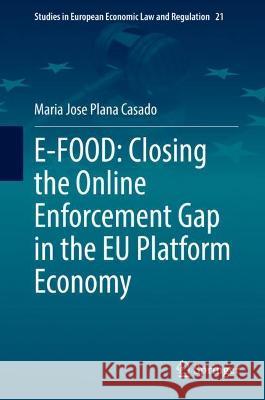E-Food: Closing the Online Enforcement Gap in the EU Platform Economy » książka
topmenu
E-Food: Closing the Online Enforcement Gap in the EU Platform Economy
ISBN-13: 9783030795061 / Angielski / Miękka / 2022
E-Food: Closing the Online Enforcement Gap in the EU Platform Economy
ISBN-13: 9783030795061 / Angielski / Miękka / 2022
cena 523,30
(netto: 498,38 VAT: 5%)
Najniższa cena z 30 dni: 501,19
(netto: 498,38 VAT: 5%)
Najniższa cena z 30 dni: 501,19
Termin realizacji zamówienia:
ok. 16-18 dni roboczych.
ok. 16-18 dni roboczych.
Darmowa dostawa!
Retail is ‘going digital,’ and grocery shopping is no exception. While some businesses are relaying on their corporate website to make the sale, both traditional brick-and-mortar and new disruptive business models are increasingly using online marketplaces to offer their products online. European Union law has been gradually updated to reflect this new reality, with Intellectual Property Rights legislation and Consumer Law leading the way toward a suitable regulatory framework in the Platform Economy. However, the EU has not devised a comprehensive strategy for tackling the challenges posed by the online sale of physical consumer goods, such as effective public enforcement in online environments. In fact, sector-specific legislation, including Food Law, largely ignores online transactions.
In this context, the book evaluates the impact that online marketplaces are having on European Union sector-specific legislation and its e-nforcement. The goal is to assess whether the existing regulatory and policy framework are sufficient for promoting compliance and bridging the enforcement gap in the digital single market. Focusing on the e-food market, the book presents a state-of-the-art overview of how online marketplaces are altering EU law and its enforcement by public authorities. 










